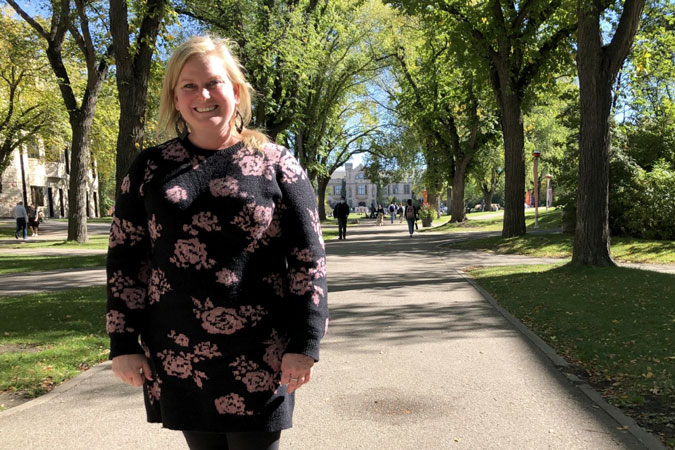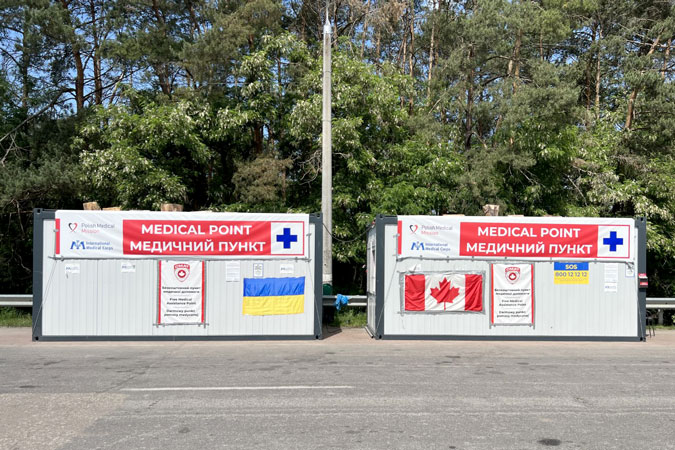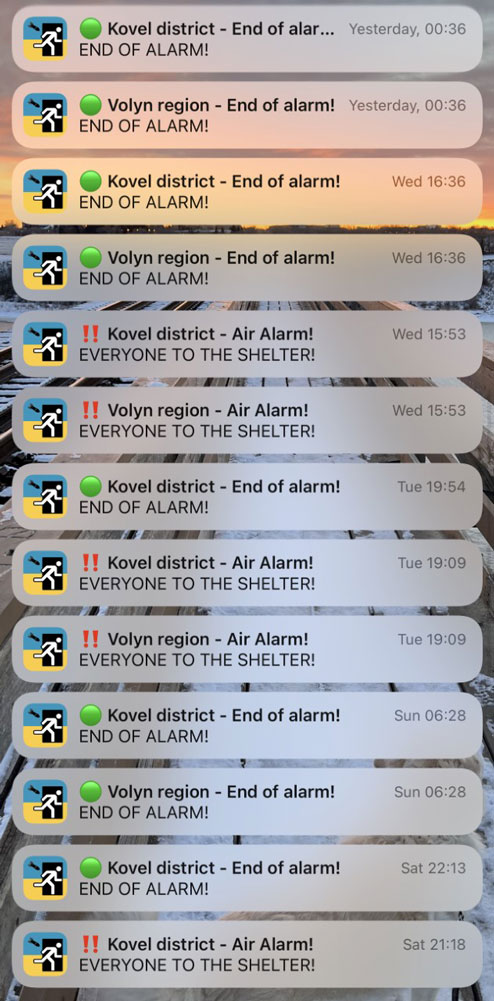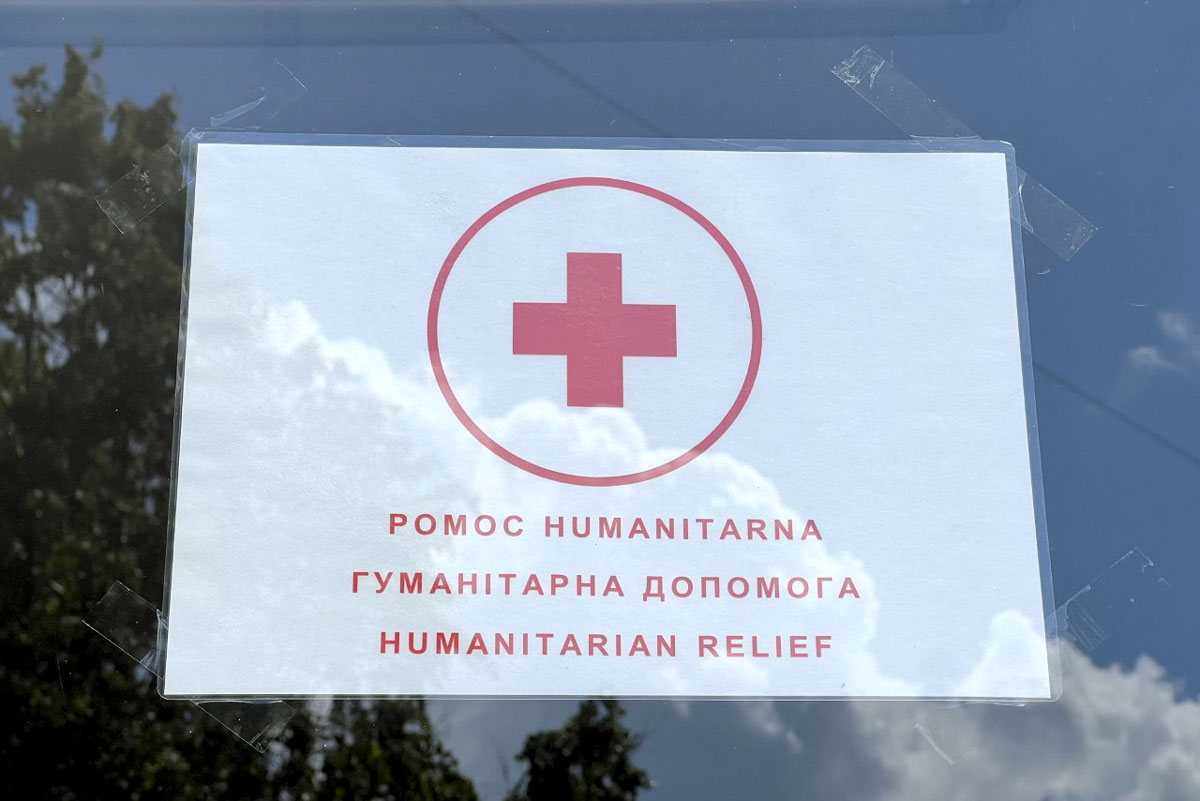On a mission of hope – and help
USask alumna travels to war-torn Ukraine to support civilians
By JOHN GRAINGERA backlog of trucks on the border between Ukraine and Poland is a daily occurance. Photography: Rachel Johnson
It’s not as if Rachel Johnson (MN’21) was looking for trouble when she decided to offer her nursing skills after Russia’s military move to occupy Ukraine.
“I find that I thrive in these situations, that are unconventional. Deep down, I knew this was something that I needed to be part of,” says Johnson, on why she spent three weeks soon after the war began in the spring as a volunteer for the Canadian Medical Assistance Team (CMAT), a team of health-care professionals dedicated to supporting Ukrainians displaced during the incursion.

There were two physicians, two nurse practitioners, four registered nurses and a translator (also a midwife) as part of her team which was based in western Ukraine, near the Polish border.
Her nine-person team operated at three sites, including a shipping container converted into a health clinic. This is where Ukrainians were offered free primary care and treatment similar to a typical walk-in clinic one could find in Saskatchewan.

“Everyone was affected by the war. Everyone,” says Johnson, who came to Saskatchewan nine years ago from Toronto, but ended up relocating, leaving her parents and two siblings behind.
“My family was proud of what I was doing and extremely supportive. Nobody was really surprised by it, just maybe not expecting it.”
Her grandfather was a conscientious objector during the Second World War and served by delivering medical supplies in the front lines in China.
“I think there’s a way to be able to support without taking up arms,” says Johnson. “The other side of it was I was not going to a combat zone, I was going to a conflict area. So, there was risk, or course, but it wasn’t an active zone.”
Johnson is not your typical health-care provider and nurse practitioner. She has always sought out the most vulnerable and offered her skills in remote locations, such as communities in northern Saskatchewan.

In Saskatoon, she works at USask in the ground-breaking virtual care and robotics program. As well, she still finds time to work as a nurse practitioner at a Saskatoon clinic and tries to find time to return to northern Saskatchewan to help where she can.
Johnson and her team would work in Ukraine, but at night they would return across the Polish border to sleep. But make no mistake, there was risk for Johnson and her team.
“But the opportunity to do good and help outweighed the risks we faced.”
The Ukrainians she was dealing with every day were people who had fled combat zones in places such as Kiev or Mariupol seeking safety in the western part of the country.
“Every single person was affected by the war, the invasion. It was felt by all Ukrainians,” says Johnson. “We heard a lot of heartbreaking stories and witnessed a lot of horrific things.”
One particular memory for Johnson occurred while she was stationed at the shipping container clinic right at the border.
“Cars would drive up, stop, and everybody would get out, the families. They’d be saying these heart-wrenching goodbyes,” recalls Johnson.
“The women and children would get into cars and cross the border while the men stood and watched and then turned around and drove back into Ukraine. They were not allowed to leave the country. I would literally be watching families torn apart. You’d literally be watching these people saying goodbye and not knowing if or when they would be seeing each other again.
“That’s just horrendous. Just horrendous. But that’s just the reality for most Ukrainians.”
Sometimes Ukrainians would arrive at their clinics mad and upset that their worlds had been turned upside down by the war.

“They felt like the world had abandoned them. But then they would see that Canadian flag and that we were from Canada and they realized they were not alone. That was gutting.
“But they would leave with big smiles on their faces. They didn’t feel as abandoned or alone anymore.”
When her stint concluded and she returned, Johnson says she was struck by an odd feeling of returning to somewhere that was safe and comforting.
“It was almost more culture shock coming home than when I was going there. It’s hard not to see how much people take for granted here.”
She knows Canadians hold Ukrainians close to their hearts, but it was stark for her seeing how easy life is in Canada compared to a war zone that spared no one.
But this was a journey worth experiencing for Johnson.
“You do learn from it and it does change you. Any exposure to anything different I feel broadens your perspective and understanding.”
Johnson also felt Ukrainians needed more help than she could solely provide while she was there.
“It can be frustrating when you can’t do more and we had to sort of step back and realize you can’t fix everything, you can’t do everything. But we can make a difference for some people and that is still worth doing.
“I didn’t change the tide in the war. I didn’t do anything grand, but I was able to support people when they needed help."
Would Johnson ever want to return to Ukraine again?
“Absolutely.”


